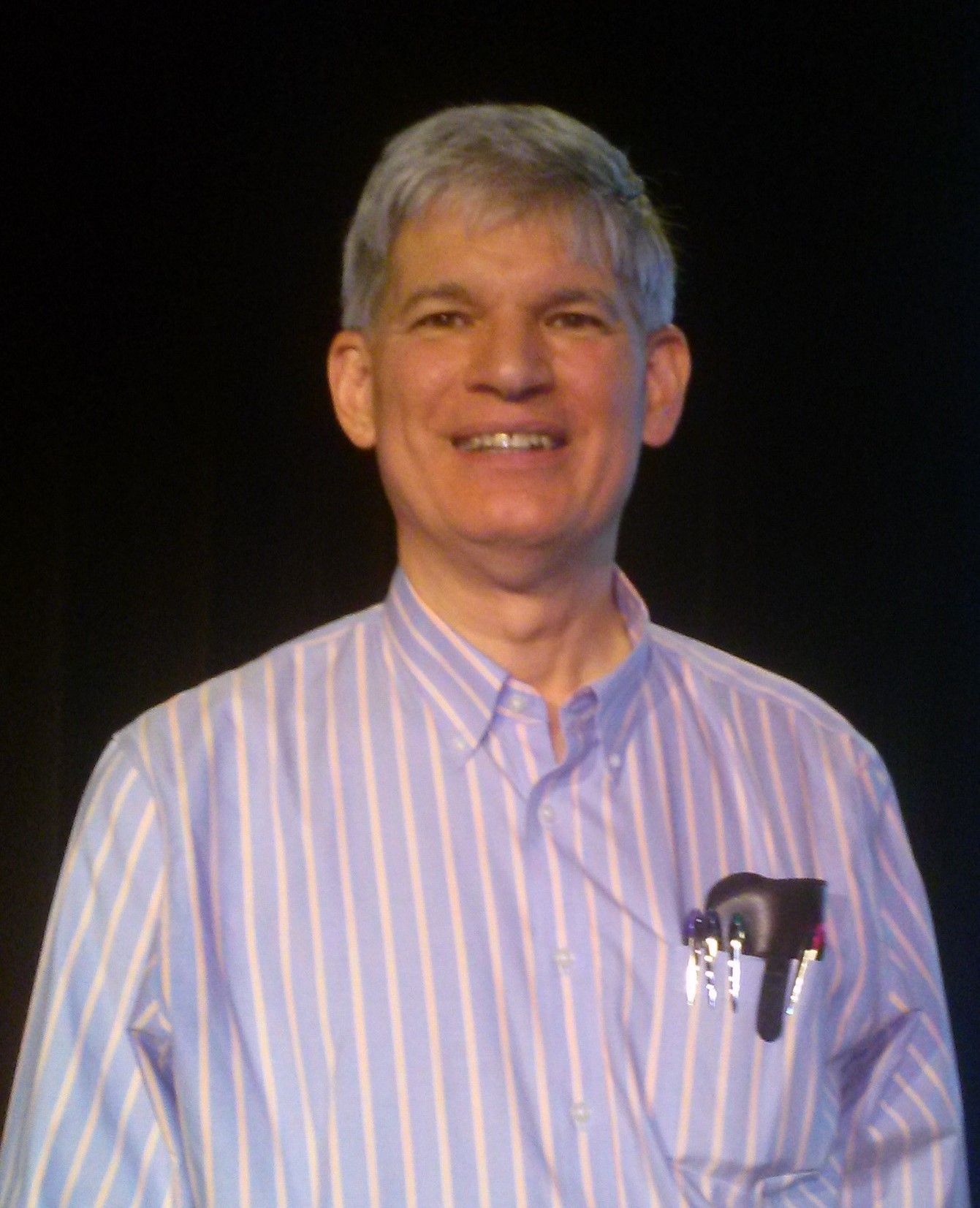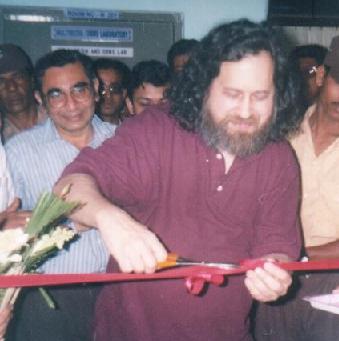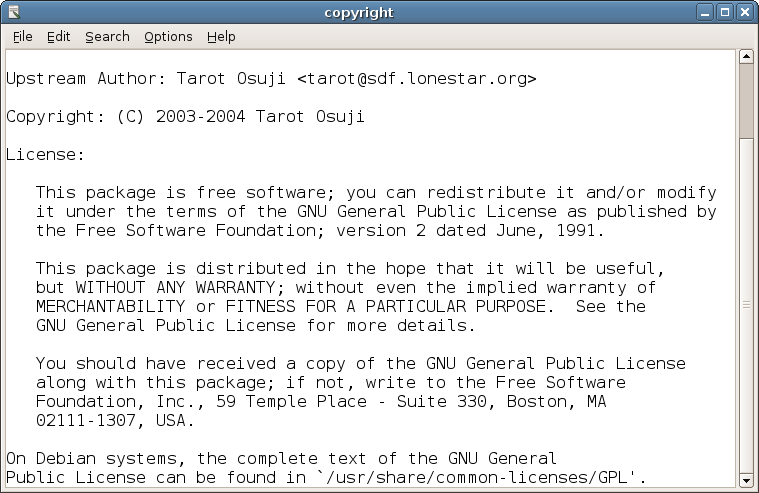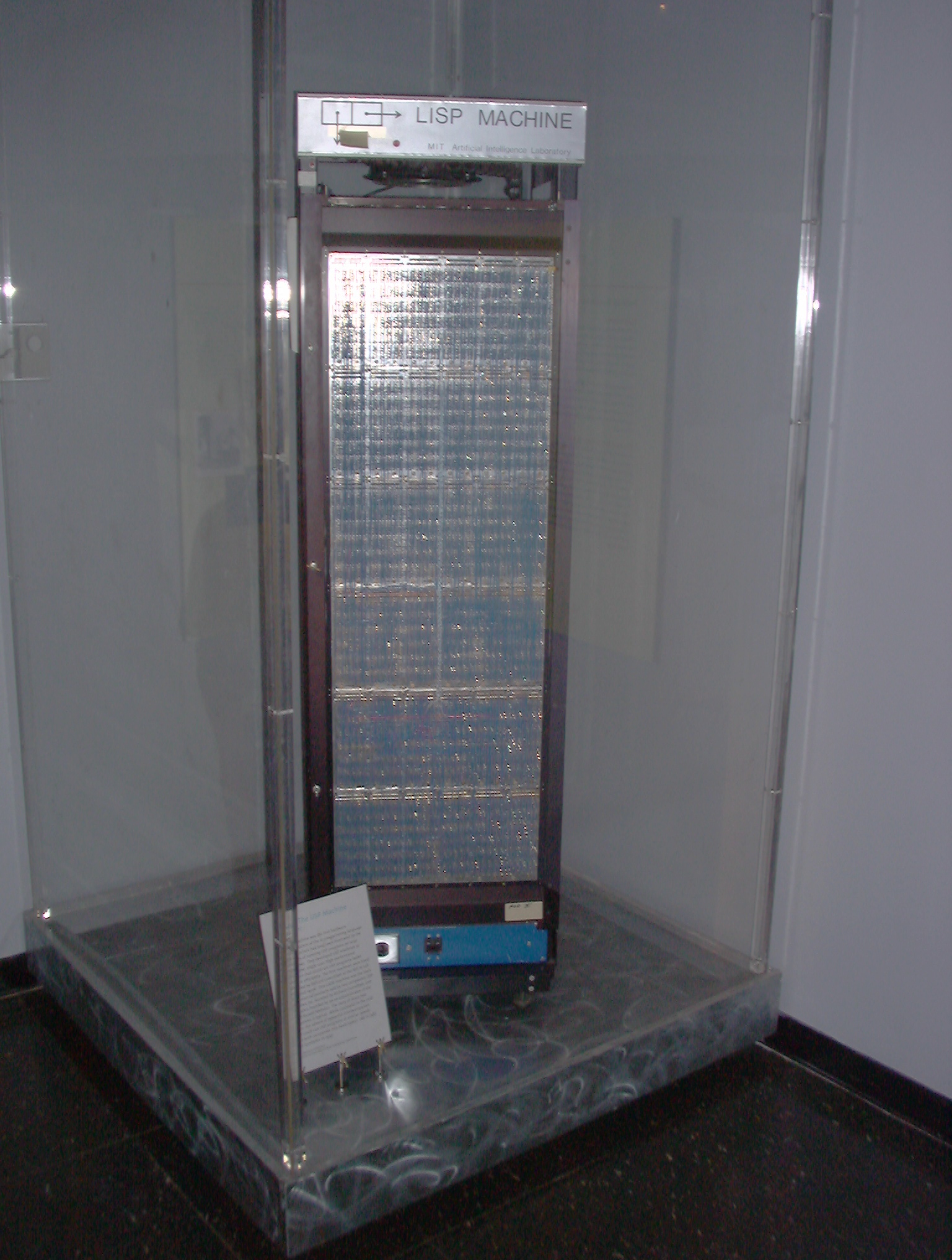|
Emacs
Emacs , originally named EMACS (an acronym for "Editor MACroS"), is a family of text editors that are characterized by their extensibility. The manual for the most widely used variant, GNU Emacs, describes it as "the extensible, customizable, self-documenting, real-time display editor". Development of the first Emacs began in the mid-1970s, and work on its direct descendant, GNU Emacs, continues actively; the latest version is 28.2, released in September 2022. Emacs has over 10,000 built-in commands and its user interface allows the user to combine these commands into macros to automate work. Implementations of Emacs typically feature a dialect of the Lisp programming language, allowing users and developers to write new commands and applications for the editor. Extensions have been written to, among other things, manage files, remote access, e-mail, outlines, multimedia, git integration, and RSS feeds, as well as implementations of '' ELIZA'', '' Pong'', '' Conway's L ... [...More Info...] [...Related Items...] OR: [Wikipedia] [Google] [Baidu] |
GNU Emacs
GNU Emacs is a free software text editor. It was created by GNU Project founder Richard Stallman, based on the Emacs editor developed for Unix operating systems. GNU Emacs has been a central component of the GNU project and a flagship project of the free software movement. Its name has occasionally been shortened to GNUMACS. The tag line for GNU Emacs is "the extensible self-documenting text editor". History In 1976, Stallman wrote the first Emacs (“Editor MACroS”), and in 1984, began work on GNU Emacs, to produce a free software alternative to the proprietary Gosling Emacs. GNU Emacs was initially based on Gosling Emacs, but Stallman's replacement of its Mocklisp Interpreter (computing), interpreter with a true Lisp interpreter required that nearly all of its code be rewritten. This became the first program released by the nascent GNU Project. GNU Emacs is written in C and provides Emacs Lisp, also implemented in C, as an extension language. Version 13, the first public r ... [...More Info...] [...Related Items...] OR: [Wikipedia] [Google] [Baidu] |
XEmacs
XEmacs is a graphical- and console-based text editor which runs on almost any Unix-like operating system as well as Microsoft Windows. XEmacs is a fork, based on a version of GNU Emacs from the late 1980s. Any user can download, use, and modify XEmacs as free software available under the GNU General Public License version 2 or any later version. History Between 1987 and 1993 significant delays occurred in bringing out a new version of GNU Emacs (presumed to be version 19). In the late 1980s, Richard P. Gabriel's Lucid Inc. faced a requirement to ship Emacs to support the Energize C++ IDE. So Lucid recruited a team to improve and extend the code, with the intention that their new version, released in 1991, would form the basis of GNU Emacs version 19. However, they did not have time to wait for their changes to be accepted by the Free Software Foundation (FSF). Lucid continued developing and maintaining their version of Emacs, while the FSF released version 19 of GNU Emacs a yea ... [...More Info...] [...Related Items...] OR: [Wikipedia] [Google] [Baidu] |
Dunnet (video Game)
''Dunnet'' is a surreal, cyberpunk text adventure written by Ron Schnell, based on a game he wrote in 1982. The name is derived from the first three letters of ''dungeon'' and the last three letters of ''ARPANET''. It was first written in Maclisp for the DECSYSTEM-20, then ported to Emacs Lisp in 1992. Since 1994 the game has shipped with GNU Emacs; it also has been included with XEmacs. The game has been recommended to writers considering writing interactive fiction. Plot The game starts out with the player standing at the end of a dirt road, but it turns to the surreal when players realize that they are actually walking around inside a Unix system, and teleporting themselves around the Arpanet. There are many subtle jokes in this game, and there are multiple ways of ending the game. Throughout the game the player moves through different areas and rooms trying to collect treasure to earn points. Legacy Dunnet is playable on any operating system with the Emacs editor. Emac ... [...More Info...] [...Related Items...] OR: [Wikipedia] [Google] [Baidu] |
Dired
Dired (for Directory Editor) is a computer program for editing file system directories. It typically runs inside the Emacs text editor as a specialized mode, though standalone versions have been written. Dired was the file manager, or visual editor of file system information. The first version of Dired was written as a stand-alone program independently in 1972 by Dave Lebling at Project MAC, and circa 1974 by Stan Kugell at the Stanford Artificial Intelligence Laboratory (SAIL). It was incorporated into GNU Emacs from the earliest versions, and re-implemented in C and C++ on other operating systems. When run in Emacs, dired displays an ls-like file listing in an Emacs buffer. The list can be navigated using standard navigation commands. Several Emacs Lisp scripts have been developed to extend Dired in Emacs. In combination with Tramp it is able to access remote file systems for editing files by means of SSH, FTP, telnet and many other protocols, as well as the capability o ... [...More Info...] [...Related Items...] OR: [Wikipedia] [Google] [Baidu] |
Richard Stallman
Richard Matthew Stallman (; born March 16, 1953), also known by his initials, rms, is an American free software movement activist and programmer. He campaigns for software to be distributed in such a manner that its users have the freedom to use, study, distribute, and modify that software. Software that ensures these freedoms is termed free software. Stallman launched the GNU Project, founded the Free Software Foundation (FSF) in October 1985, developed the GNU Compiler Collection and GNU Emacs, and wrote the GNU General Public License. Stallman launched the GNU Project in September 1983 to write a Unix-like computer operating system composed entirely of free software. With this, he also launched the free software movement. He has been the GNU project's lead architect and organizer, and developed a number of pieces of widely used GNU software including, among others, the GNU Compiler Collection, GNU Debugger, and GNU Emacs text editor. Stallman pioneered the concept of co ... [...More Info...] [...Related Items...] OR: [Wikipedia] [Google] [Baidu] |
Magit
Magit is an interface to the Git version control system (a Git Client), implemented as a GNU Emacs package written in Elisp. It is made available through the MELPA package repository, on which it is the most-downloaded non-library package, with almost three million downloads as of July 2021. Like many graphical user interfaces, Magit provides a visual interface to represent version control actions; however, it uses a keyboard-centric model, and also functions as a text-based user interface. The issue of key-memorization is mitigated through use of a popup menu which displays the actions available to the user — serving as a mnemonic aid. History Magit was created by Marius Vollmer in 2008, with Jonas Bernoulli assuming the role of maintainer in 2013. Since its release, Magit has seen a high degree of community involvement, with 350 individuals having contributed code to this free software project as of September 2020. In 2018 Magit underwent a Kickstarter funding campaign ... [...More Info...] [...Related Items...] OR: [Wikipedia] [Google] [Baidu] |
Gnus
Gnus (), or Gnus Network User Services, is a message reader which is part of GNU Emacs. It supports reading and composing both e-mail and news and can also act as an RSS reader, web processor, and directory browser for both local and remote filesystems. Gnus blurs the distinction between news and e-mail, treating them both as "articles" that come from different sources. News articles are kept separate by group, and e-mail can be split into arbitrary groups, similar to folders in other mail readers. In addition, Gnus is able to use a number of web-based sources as inputs for its groups. Features Some Gnus features: * a range of backends that support any or all of: ** reading email from the local filesystem, or over a network via IMAP or POP3 ** reading web pages via an RSS feed ** treating a directory of files, either local or remote (via FTP or other method) as articles to browse ** reading Usenet News, including the Gmane and Gwene mail-to-news archives of mailing lis ... [...More Info...] [...Related Items...] OR: [Wikipedia] [Google] [Baidu] |
EMMS (media Player)
EMMS (Emacs MultiMedia System) is media player software for Emacs. It is written in Emacs Lisp. The name could possibly echo XMMS. It may be derived from an earlier Emacs-based player called mp3-player. EMMS may have multiple back ends to connect to external players so EMMS can support a few different audio and video formats, while remaining clean and small itself. EMMS is divided into three parts, the player back ends, media sources (which can be a local file system or a network stream), and the core player. One of the player back ends connects to MPD. Other backends are available for mplayer and gstreamer. Additional players can be easily defined. EMMS implements a buffer-based playlist and queue. Locations in files can be bookmarked. Standard Emacs key bindings are used to navigate, edit the playlist, and control playback. Using Emacs server support, playlists can be built using a file manager such as ROX-Filer. EMMS supported scrobbling to Last.fm until version 4.0, when ... [...More Info...] [...Related Items...] OR: [Wikipedia] [Google] [Baidu] |
Text Editor
A text editor is a type of computer program that edits plain text. Such programs are sometimes known as "notepad" software (e.g. Windows Notepad). Text editors are provided with operating systems and software development packages, and can be used to change files such as configuration files, documentation files and programming language source code. Plain text and rich text There are important differences between plain text (created and edited by text editors) and rich text (such as that created by word processors or desktop publishing software). Plain text exclusively consists of character representation. Each character is represented by a fixed-length sequence of one, two, or four bytes, or as a variable-length sequence of one to four bytes, in accordance to specific character encoding conventions, such as ASCII, ISO/IEC 2022, Shift JIS, UTF-8, or UTF-16. These conventions define many printable characters, but also non-printing characters that control the flow ... [...More Info...] [...Related Items...] OR: [Wikipedia] [Google] [Baidu] |
Text Editor
A text editor is a type of computer program that edits plain text. Such programs are sometimes known as "notepad" software (e.g. Windows Notepad). Text editors are provided with operating systems and software development packages, and can be used to change files such as configuration files, documentation files and programming language source code. Plain text and rich text There are important differences between plain text (created and edited by text editors) and rich text (such as that created by word processors or desktop publishing software). Plain text exclusively consists of character representation. Each character is represented by a fixed-length sequence of one, two, or four bytes, or as a variable-length sequence of one to four bytes, in accordance to specific character encoding conventions, such as ASCII, ISO/IEC 2022, Shift JIS, UTF-8, or UTF-16. These conventions define many printable characters, but also non-printing characters that control the flow ... [...More Info...] [...Related Items...] OR: [Wikipedia] [Google] [Baidu] |
Org-mode
Org Mode (also: ''org-mode''; ) is a document editing, formatting, and organizing mode, designed for notes, planning, and authoring within the free software text editor Emacs. The name is used to encompass plain text files ("org files") that include simple marks to indicate levels of a hierarchy (such as the outline of an essay, a topic list with subtopics, nested computer code, etc.), and an editor with functions that can read the markup and manipulate hierarchy elements (expand/hide elements, move blocks of elements, check off to-do list items, etc.). Org Mode was created by Carsten Dominik in 2003, originally to organize his own life and work, and since the first release numerous other users and developers have contributed to this free software package. Emacs has included Org Mode as a major mode by default since 2006. Bastien Guerry is the current maintainer, in cooperation with an active development community. Since its success in Emacs, some other systems now provide funct ... [...More Info...] [...Related Items...] OR: [Wikipedia] [Google] [Baidu] |
Lisp (programming Language)
Lisp (historically LISP) is a family of programming languages with a long history and a distinctive, fully parenthesized prefix notation. Originally specified in 1960, Lisp is the second-oldest high-level programming language still in common use, after Fortran. Lisp has changed since its early days, and many dialects have existed over its history. Today, the best-known general-purpose Lisp dialects are Common Lisp, Scheme, Racket and Clojure. Lisp was originally created as a practical mathematical notation for computer programs, influenced by (though not originally derived from) the notation of Alonzo Church's lambda calculus. It quickly became a favored programming language for artificial intelligence (AI) research. As one of the earliest programming languages, Lisp pioneered many ideas in computer science, including tree data structures, automatic storage management, dynamic typing, conditionals, higher-order functions, recursion, the self-hosting compiler, and the ... [...More Info...] [...Related Items...] OR: [Wikipedia] [Google] [Baidu] |





